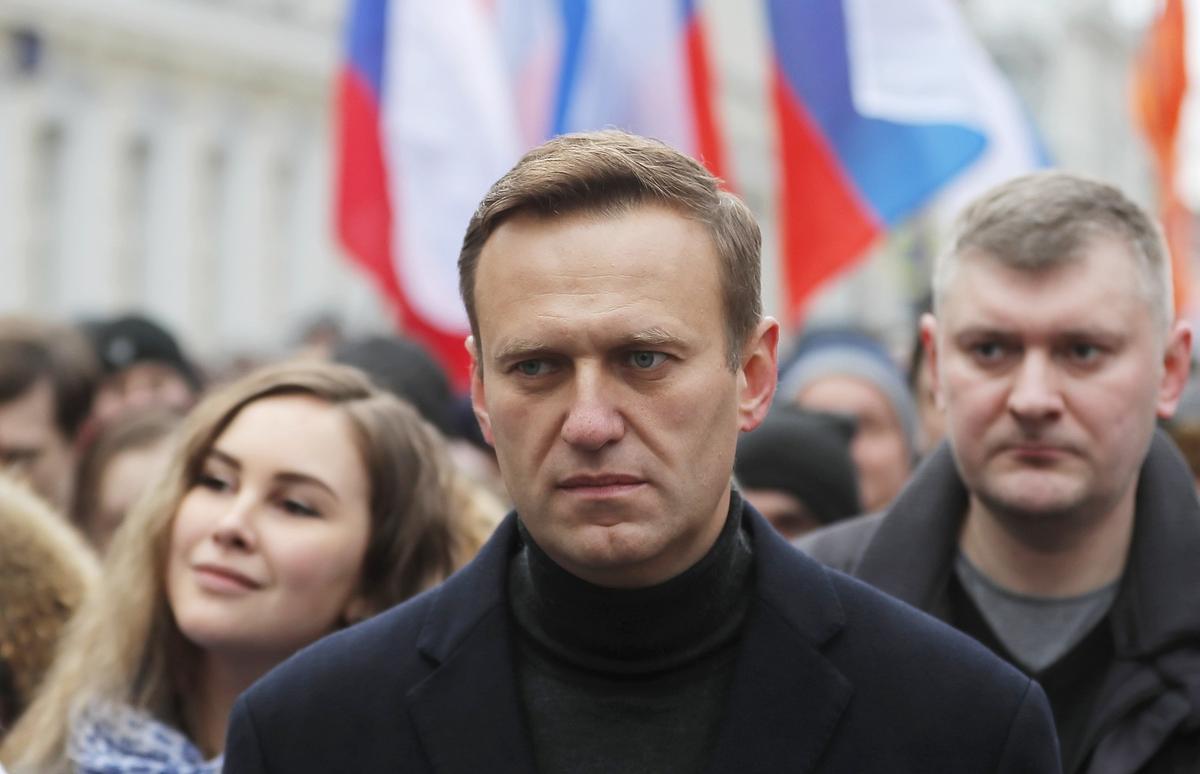



Alexey Navalny takes part in a memorial march in Moscow for opposition politician Boris Nemtsov, marking the fifth anniversary of his assassination. 29 February 2020. Photo: EPA / YURI KOCHETKOV
Allies of the late Russian opposition politician Alexey Navalny have reconstructed the timeline of his death in an Arctic prison in February 2024 and conducted independent lab tests confirming that he was poisoned, the politician’s widow Yulia Navalnaya announced on Wednesday.
Navalnaya said that Navalny’s Anti-Corruption Foundation (FBK) had managed to obtain biological samples from Navalny’s body and had them sent abroad for testing, after which two laboratories in separate countries both independently concluded that Navalny had been poisoned.
The FBK’s findings were part of a long-running investigation that unearthed testimony from prison staff at the IK-3 prison colony in the town of Kharp in the Arctic Yamalo-Nenets autonomous district, where Navalny died suddenly in mysterious circumstances on 16 February 2024.
According to five prison guards questioned in relation to Navalny’s death, the politician first complained of pain in his leg on 3 February, after which he was taken to a doctor’s surgery where he had his blood pressure and temperature taken. Navalny then demanded to be seen by a neurologist, but was told that there were no qualified doctors available.
On the morning of 16 February, Navalny complained of pain in his leg again, three prison guards said in separate testimonies. At 12:10pm Navalny was taken for a walk after lunch into a separate isolated yard, after which he knocked on the door and said he was feeling unwell.
Navalny was then led back to his isolated cell, where he laid down on the floor in a fetal position and started moaning in pain, saying his chest and stomach were burning, before vomiting, the investigation found.
One prison guard, Anton Nemtsev, said that Navalny was having convulsions, breathing heavily, coughing and moaning, but was nevertheless left alone in his cell for some time until Alexey Lisyuk, the head of the medical unit, returned from lunch. As Navalny was being transferred from his cell to the medical unit, he began to wheeze and promptly lost consciousness.
An ambulance was called at 1:25pm, over 40 minutes after Navalny fell ill, and the staff began doing chest compressions. The cardiogram carried out by Lisyuk only showed “isolated heartbeats”. An ambulance crew, who arrived 10 minutes later, attempted to resuscitate Navalny, but was unsuccessful, pronouncing him dead at 2:23pm with the diagnosis “convulsive syndrome, sudden death syndrome”.
Navalnaya added that footage from the 63 security cameras monitoring Navalny’s prison block appeared to have been deleted. The FBK only managed to obtain a photo from Navalny’s cell on the day of his death, showing vomit on the floor. “The Kremlin would have shown these videos long ago if they wanted everyone to see that they aren’t lying: here’s Navalny walking around, here he falls ill, they try to resuscitate him, but they can’t save him,” Navalnaya said. “Apparently, the footage contains something that does not fit the official version at all.”
“I don’t know what to do next. A Russian citizen was killed. Murdered on Russian soil. All the forensic evidence is also there. Western countries have no legal grounds to open and pursue a criminal case,” Navalnaya said, adding that some parties may take into account “political considerations”, not wanting “the inconvenient truth” to be revealed at an inopportune moment.
“But I will not remain silent. I assert that Vladimir Putin is guilty of the murder of my husband, Alexey Navalny,” Navalnaya said, urging the international community to “stop flirting with Putin for some higher considerations”.
“You will not be able to appease him. As long as you remain silent, he will not stop. Perhaps right now, someone else is dying from the poison that Putin ordered to be used to kill him,” Navalnaya said.

